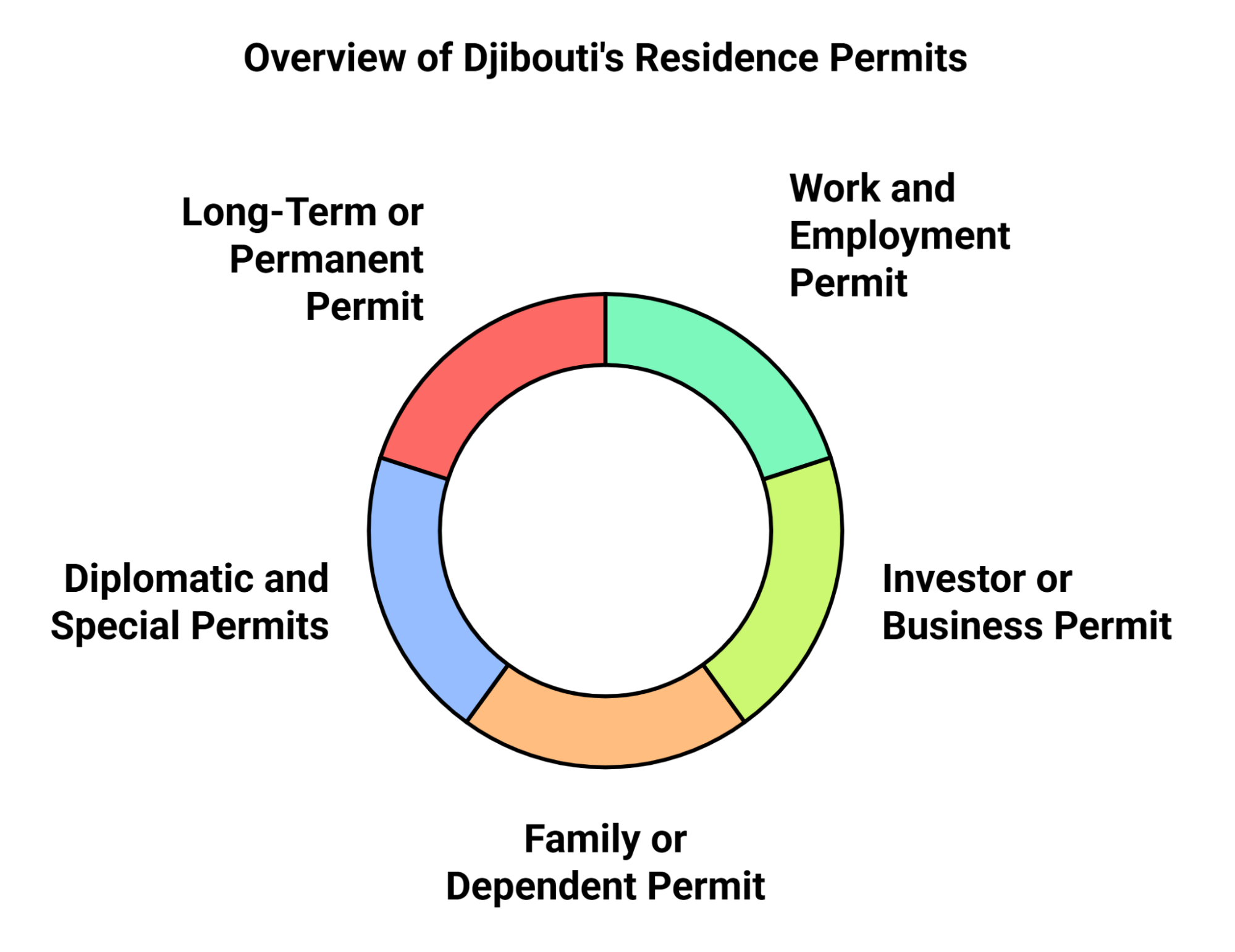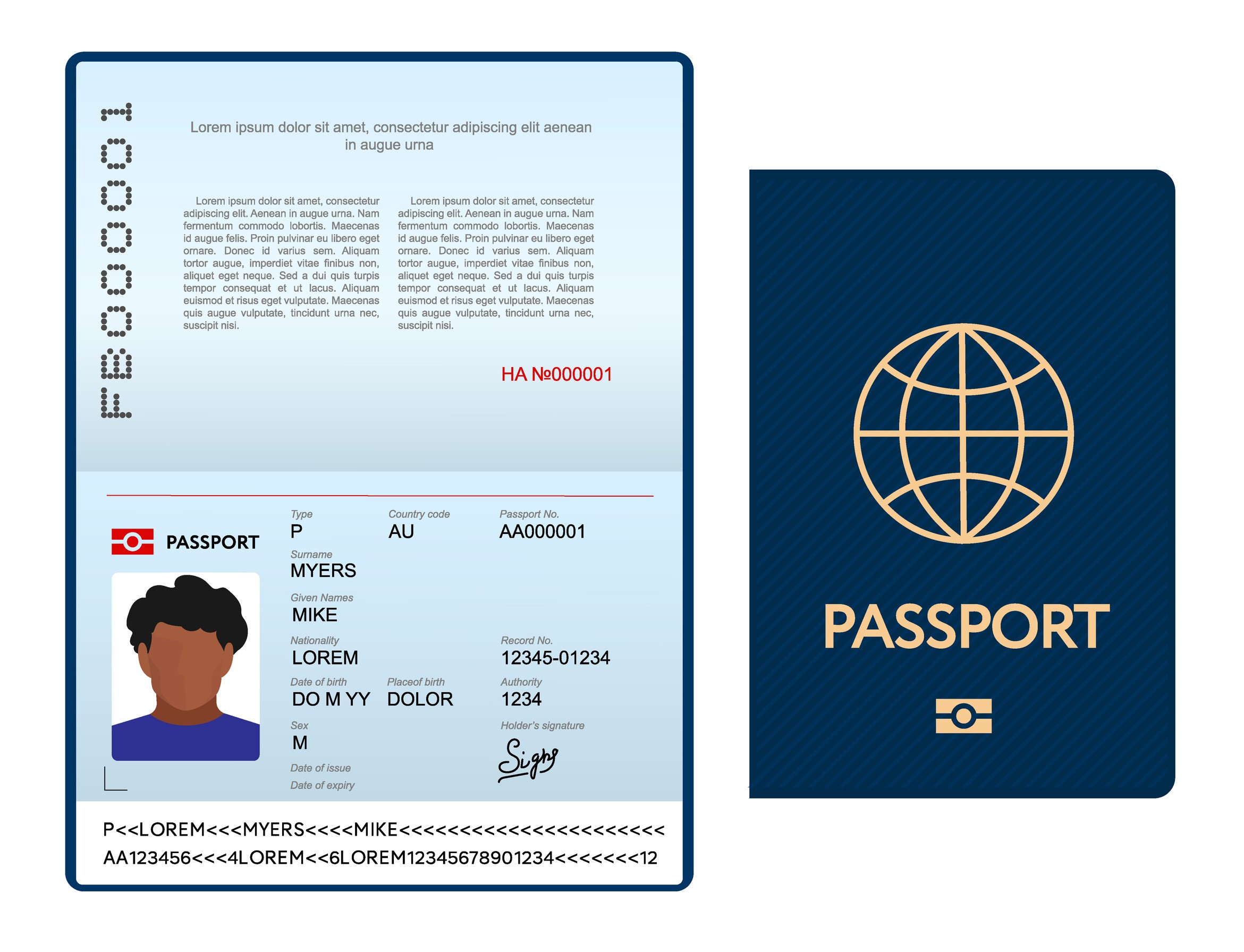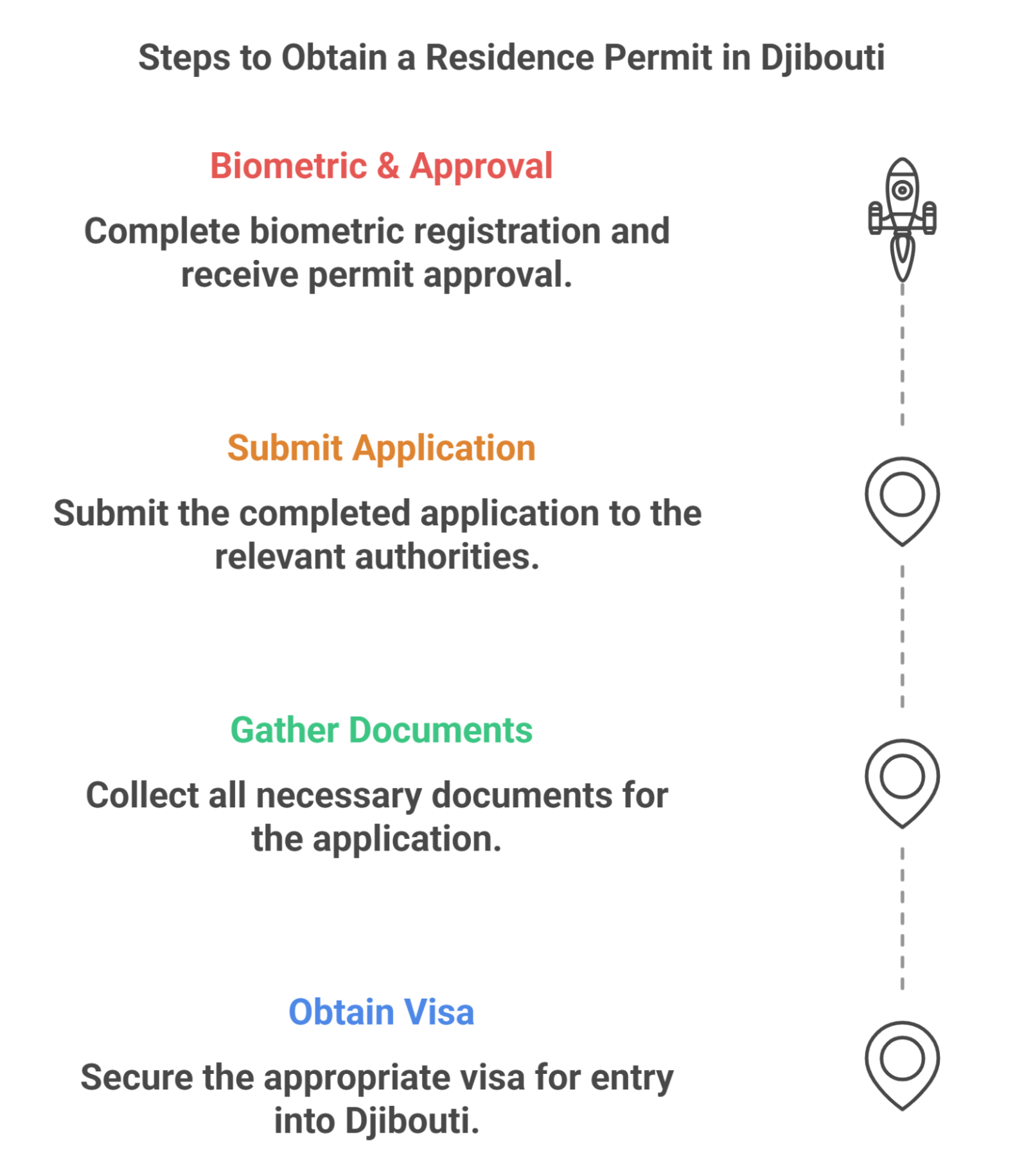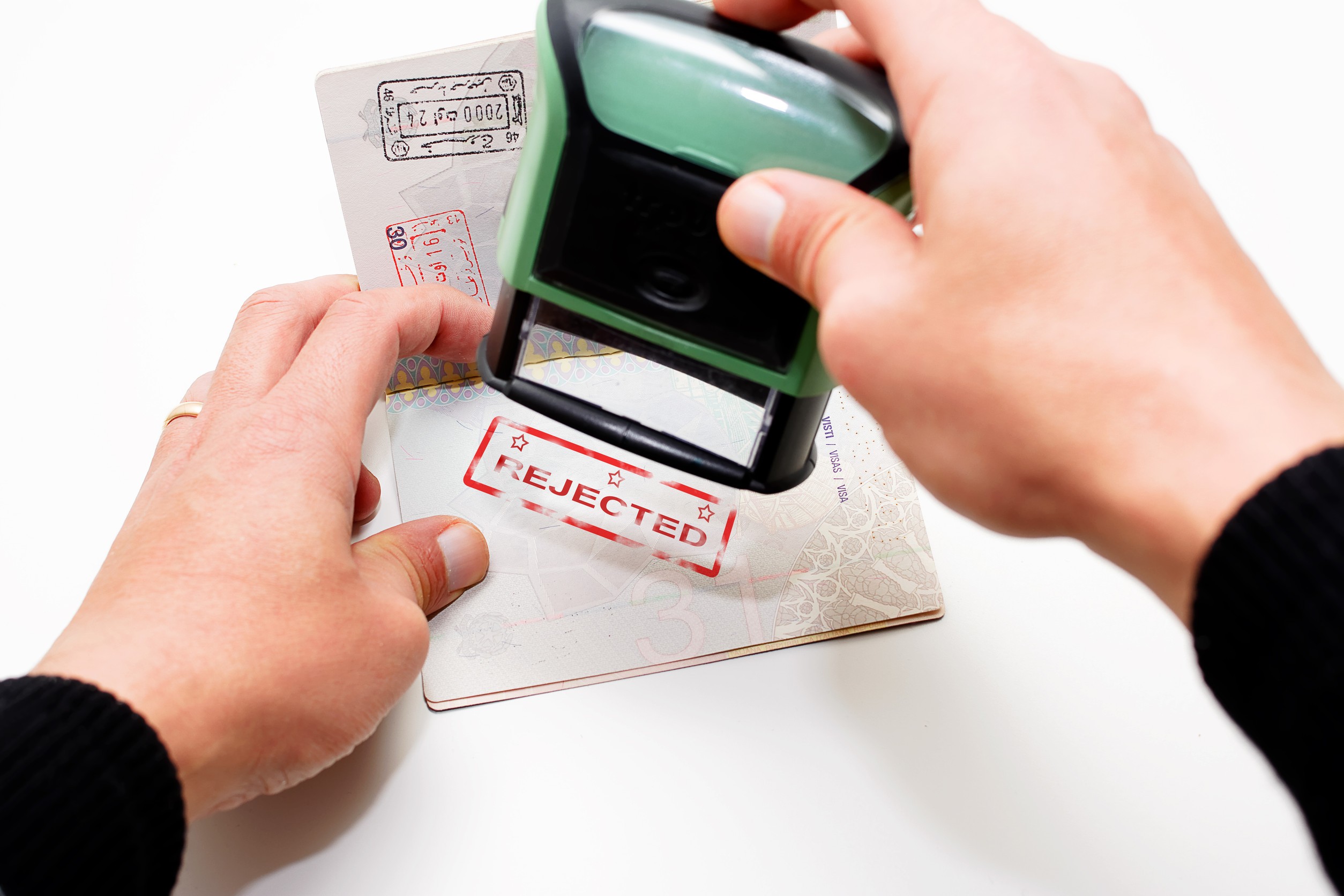Residence Permits in Djibouti

Djibouti, a small but strategically significant country in the Horn of Africa, attracts expatriates, investors, and foreign workers due to its growing economy, stable political environment, and strategic trade location. Whether for business, employment, or long-term residence, foreign nationals must obtain a residence permit to legally stay in Djibouti beyond short-term visits.
Types of Residence Permits in Djibouti
Djibouti offers several types of residence permits, depending on the applicant's purpose of stay. The most common categories include:
1. Work and Employment Residence Permit
This permit is issued to foreign nationals who have secured employment in Djibouti. It requires a valid work contract and employer sponsorship. The permit is typically valid for one year and can be renewed annually.
2. Investor or Business Residence Permit
Designed for foreign investors, business owners, and entrepreneurs, this permit requires proof of investment or business ownership in Djibouti. It is often linked to Djibouti’s Free Trade Zone (DIFTZ), offering business-friendly residency options.
3. Family or Dependent Residence Permit
This permit is granted to spouses, children, or dependents of foreign residents. Applicants must provide proof of family relationships, such as marriage or birth certificates. The permit's validity matches that of the sponsor’s residence permit.
4. Diplomatic and Special Permits
Issued to diplomats, foreign government officials, and employees of international organizations, these permits are processed through diplomatic channels and are subject to specific agreements.
5. Long-Term or Permanent Residence Permit
Expatriates who have lived in Djibouti for an extended period, usually over 10 years, may apply for this permit. Applicants must provide proof of continuous legal residence and demonstrate financial self-sufficiency.

Eligibility Criteria for a Djibouti Residence Permit
Applying for a residence permit in Djibouti involves meeting certain criteria to ensure that applicants are eligible for long-term or permanent residency. The process varies depending on the type of permit being applied for, such as employment, investment, or family-based permits. Here are the main eligibility requirements:
|
Foreign Nationals : Applicants must be foreign nationals seeking to live in Djibouti for long-term or permanent residence. |
|
Valid Passport : The applicant must hold a valid passport, typically with a minimum of six months' validity remaining. |
|
Proof of Accommodation : Applicants must provide proof of stable accommodation, such as a rental contract or proof of homeownership in Djibouti. |
|
Income or Employment : Proof of sufficient income or employment (e.g., an employment contract or business documentation) to support the applicant during their stay. |
|
Health and Security Checks : Medical and criminal record checks may be required to ensure the applicant does not pose a risk to public health or safety. |
|
Duration of Stay : Applicants must demonstrate their intent to stay in Djibouti for an extended period, typically exceeding 90 days. |
|
Special Categories : For certain cases, such as investors or spouses of Djiboutian citizens, additional criteria may apply. |
General Requirements for Applying for Residence Permits in Djibouti

To obtain a residence permit in Djibouti, applicants must meet specific requirements based on their Djibouti visa category. The general requirements typically include:
- Valid Passport – Must be valid for at least six months beyond the intended stay.
- Completed Application Form – A properly filled residence permit application form.
- Proof of Legal Entry – A valid visa or entry stamp confirming lawful entry into Djibouti.
- Passport-Sized Photos – Recent colored photos that meet the official specifications.
- Proof of Financial Means – Bank statements, employment contract, or proof of investment to demonstrate financial stability.
- Employment or Business Documents (if applicable) – Work contract for employees, business registration documents for investors, or sponsorship letters from employers.
- Proof of Accommodation – Rental agreement, hotel booking, or proof of property ownership.
- Medical Certificate – Some applicants may need a health clearance from an authorized medical institution.
- Criminal Background Check – A police clearance certificate from the applicant’s home country or most recent residence.
- Additional Documents – Depending on the permit type, supporting documents such as family certificates (for dependents) or diplomatic accreditation (for diplomats) may be required.
Applicants must submit their applications to the Directorate of Immigration and Documentation in Djibouti. Processing times and fees vary depending on the permit type.
Application Process for a Residence Permit in Djibouti
Foreign nationals who wish to apply for a residence permit must follow these steps:

Step 1: Obtain a Visa for Entry
Before applying for a residence permit, most foreign nationals need to enter Djibouti with the correct visa. The type of Djibouti visa required depends on the applicant’s purpose of stay:
- Business Visa – Suitable for investors and business professionals who intend to establish or manage enterprises in Djibouti.
- Work Visa – Required for expatriates employed by a Djiboutian company or organization.
- Family Visa – For dependents of foreign residents, including spouses and children.
Since a residence permit application must be initiated after entering Djibouti, it is crucial to ensure the correct entry visa is obtained in advance.
Step 2: Gather Required Documents
Applicants must collect all necessary documents based on their specific residence permit type. Having all documents properly prepared and translated (if necessary) can help avoid delays in processing.
Step 3: Submit the Application
The residence permit application must be submitted to the Immigration and Nationality Office in Djibouti. In some cases, an employer, business partner, or investment authority may handle the submission on behalf of the applicant. Processing times vary but typically take a few weeks to a few months.
Step 4: Biometric Registration & Approval
As part of the approval process, applicants may be required to undergo biometric data collection, including:
- Fingerprint scans
- Photographs
Once the application is approved, the residence permit is issued. Holders must carry their residence permit at all times and comply with renewal or extension regulations if they wish to stay beyond its validity period.
Renewal and Extension of Residence Permits
Residence permits in Djibouti are typically issued for one year and must be renewed annually.
Renewal Process:
Applications for renewal must be submitted at least one month before the permit’s expiration. Applicants must provide updated documents (such as proof of employment or business continuity). Late renewals may result in penalties or temporary loss of legal residency.
Permanent Residence Consideration:
Foreigners who have legally resided in Djibouti for 10+ years may apply for permanent residence. Requires strong ties to Djibouti (e.g., long-term business operations, family connections, or property ownership).
Common Reasons for Residence Permit Rejections in Djibouti

Obtaining a residence permit in Djibouti can be straightforward, but there are common reasons why applications might be rejected. Understanding these can help avoid unnecessary delays or complications during the application process:
- Incomplete Application: Missing required forms or documents can lead to rejection.
- Invalid or Expired Passport: A passport with less than six months of validity remaining may cause a rejection.
- Failure to Meet Financial Requirements: Applicants must provide proof of sufficient income or employment to support their stay.
- Criminal Background Issues: A criminal record or failure to pass the security check can result in denial.
- Health Concerns: Applicants with certain contagious diseases or health issues may face rejection.
- Incorrect or Inconsistent Information: Any discrepancies between the application form and provided documents (e.g., name, nationality, date of birth) can lead to rejection.
- Failure to Demonstrate Long-Term Stay Intent: Applicants who cannot prove their intent for long-term residency or those applying for short-term purposes may be rejected.
- Lack of Proper Accommodation Proof: Not showing sufficient documentation of stable housing in Djibouti can be a reason for denial.
Benefits of Living in Djibouti
Djibouti offers a unique living experience with its strategic location, economic opportunities, and cultural diversity. Whether you're an investor, expatriate, or traveler, the country provides various advantages that make it an appealing place to live. Here are some key benefits:
- Strategic Location: Positioned at the crossroads of Africa, the Middle East, and Asia, making it a key hub for trade and travel.
- Stable Political Environment: Compared to neighboring countries, Djibouti enjoys relative political stability and security.
- Tax Incentives for Investors: Special economic zones and investment incentives attract foreign businesses and entrepreneurs.
- Growing Job Market: Opportunities in logistics, ports, renewable energy, and international organizations due to Djibouti’s economic expansion.
- Multicultural Society: A mix of African, Arab, and French influences, creating a diverse and welcoming environment.
- Unique Natural Landscapes: Stunning coastal scenery, salt lakes, and opportunities for diving, hiking, and wildlife exploration.
Key Legal Considerations for Residence in Djibouti
Before moving to Djibouti, foreign residents must understand the country’s legal requirements regarding immigration, work authorization, taxes, and citizenship. Staying compliant with these regulations is essential to avoid fines, legal issues, or residency complications.
- Compliance with Immigration Laws: Overstaying a visa or residence permit can result in fines, deportation, or re-entry restrictions. Employers must ensure foreign workers have valid permits.
- Work Authorization Restrictions: A residence permit does not grant automatic work rights; a separate work permit is required, which must be arranged by the employer.
- Tax and Financial Obligations: Foreign residents involved in business or employment may be subject to local taxes. Investors should check tax exemption policies and incentives.
- Citizenship and Naturalization: Foreigners can apply for Djibouti citizenship under special conditions, such as long-term residence or marriage to a Djiboutian citizen. Dual citizenship is allowed with specific requirements.
Common Challenges in Obtaining a Residence Permit
While Djibouti has a straightforward residence permit process, some challenges remain:
|
Challenge |
Explanation |
|
Bureaucratic Delays |
Processing can be slow, especially for first-time applicants. Many expats and investors need legal assistance to handle paperwork efficiently. |
|
High Costs |
Residence permit fees vary by category and can be costly. Business permits require significant investment proof, making it challenging for small investors. |
|
Limited Digital Services |
Most applications must be submitted in person, as Djibouti’s immigration system lacks full digitalization. Expats may also receive inconsistent information on policies. |
|
Security and Travel Restrictions |
While Djibouti is stable, regional security concerns can affect residency regulations. Some nationalities may undergo additional screening or face restrictions. |
Future Developments and Reforms in Residence Permit Policies
The Djiboutian government is modernizing its immigration system to attract skilled workers, investors, and businesses. Key developments include:
- Digitalization of Residence Permits: Plans to introduce online application systems for efficiency. Electronic residence permits (e-residence) to simplify renewals.
- Encouraging Investment-Based Residency: Expansion of investment incentives to attract foreign entrepreneurs. Strengthening the Djibouti Free Trade Zone (DIFTZ) as a hub for international businesses.
- Stronger Regional and International Collaboration: Djibouti is working with regional partners (Ethiopia, Gulf States, and China) to improve expatriate residency policies. Discussions on visa-free agreements for strategic partners to ease business travel.
Djibouti Work and Residence Permits: Key Differences
When considering living and working in Djibouti, it’s important to understand the distinctions between a work permit and a residence permit. These two documents serve different purposes, and understanding their differences can help avoid confusion and ensure compliance with Djibouti’s immigration laws.
|
Aspect |
Work Permit |
Residence Permit |
|
Purpose |
Allows employment in Djibouti |
Allows residing in Djibouti |
|
Application Process |
Requires a job offer and employer application |
Can be applied for independently |
|
Eligibility |
Issued to skilled workers or professionals |
Can be issued regardless of employment |
|
Validity |
Typically short-term, tied to employment contract |
Longer duration (1-3 years), renewable |
|
Rights and Restrictions |
Limited to employment; restricted to one employer |
Allows residency, but work requires a work permit |
|
Family Members |
Dependents can reside but can't work without a work permit |
Dependents can apply for residency but need work permits for employment |
In Summary
Djibouti offers various residence permit options for expatriates, investors, and foreign workers. While the application process is relatively straightforward, challenges such as bureaucratic delays, high fees, and limited online services can create difficulties for applicants.
To improve its attractiveness for foreign residents, Djibouti is modernizing its immigration policies, expanding digital services, and encouraging investment-based residency. With these changes, Djibouti is positioning itself as a more business-friendly and expatriate-welcoming country in the region.
Frequently Asked Questions
Any foreigner planning to stay in Djibouti for more than 90 days must apply for a residence permit.
Djibouti offers residence permits for work, investment, family reunification, and long-term stays.
No, a residence permit alone does not grant work rights; a separate work permit is required for employment.
Applicants may need to show proof of sufficient income, employment, or business investment to support their stay.
Long-term residents may apply for citizenship after meeting specific residency requirements, including continuous stay and legal compliance.
Content Disclaimer: While this information was last updated in January 2026, we strongly suggest confirming all travel details with the appropriate governmental agencies, embassies, and airlines.
